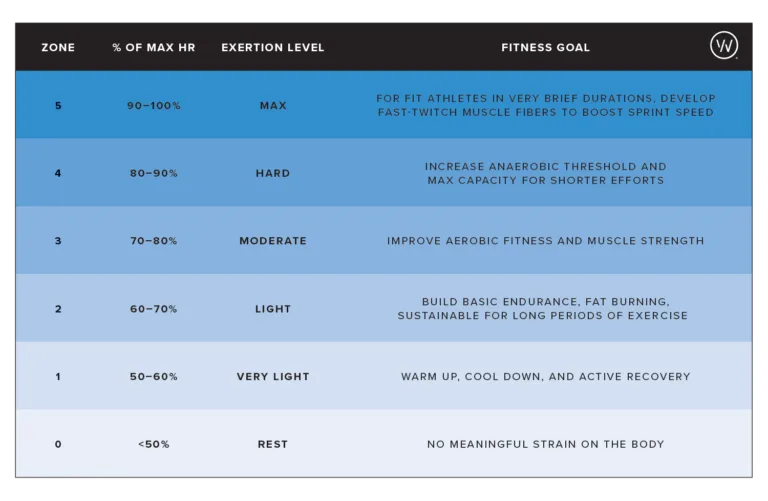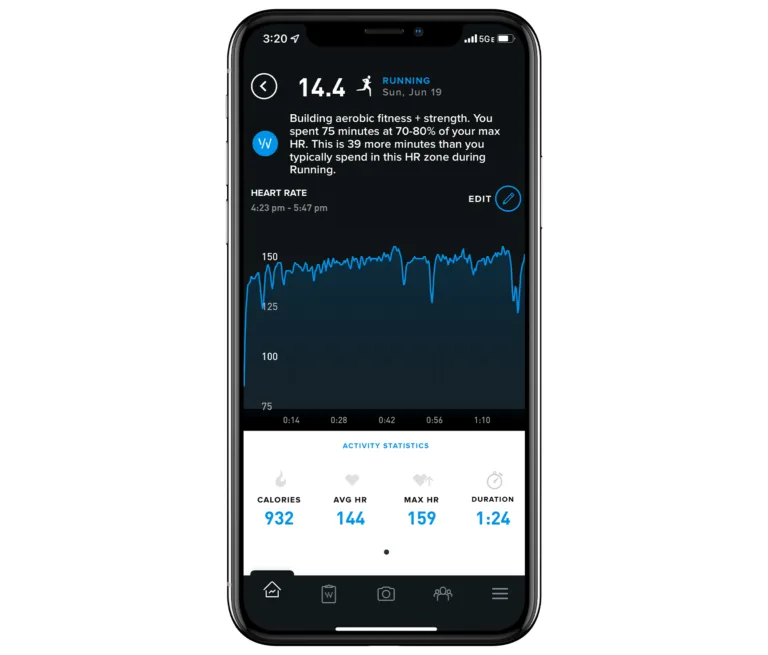Topics
- Article
- Heart Rate
- Running
9 Reasons Why Your Heart Rate is High on Easy Runs

You’re on a long run day in your training plan, so you’re taking it easy and trying to maintain your desired pace. You look down at your heart rate monitor and discover your heart rate is way above your target heart rate. There are many reasons your heart rate might be high during your easy runs but before we get into the potential causes, it’s important to know your resting and maximum heart rates, and your heart rate training zones, so that you can understand your personal baseline.
Establish Your Baseline
Your normal resting heart rate (RHR) is unique and changes as you age. Factors that can affect your RHR include your weight and health, stress, amount of sleep you get, certain medications, alcohol and tobacco use, and the weather. The best time to measure your resting heart rate is first thing in the morning, or by using a heart rate monitor like WHOOP. WHOOP calculates your RHR each night using a dynamic average weighted towards your deepest periods of sleep, allowing for consistent readings. Maximum heart rate also changes as you age. Max heart rate is the greatest number of beats per minute (bpm) your heart can possibly reach during all-out strenuous exercise. To find yours, you can use a formula like the Tanaka (208 – 0.7 x age) or the Gulati (206 – 0.88 x age, for women only). Every human body is different with varying maximum heart rates, so a better solution is to use a wrist-worn heart rate monitor like WHOOP to determine your individual max heart rate. By knowing your max HR you can establish your heart rate training zones. Heart rate zones are a percentage of your maximum heart rate. HR zone training is an efficient way to improve your cardiovascular fitness while challenging yourself. For example, during your easy run, your heart rate should be in the 60-70% of your max heart rate. This is a heart rate that’s sustainable for long periods of exercise, such as a long run.

Heart rate training lets you improves your cardiovascular fitness while challenging yourself.
Now that you’ve established a baseline, you can measure your heart rate during training and understand what a high running heart rate looks and feels like.
9 Reasons Why Your Running HR is High
One of the simplest reasons your heart rate is high during easy runs is that your run isn’t actually that easy. You might be on the same jogging path you use every day, but today your heart rate is unusually high. Or, you might have taken a morning jog on a dirt road near your vacation cabin and note your heart rate was abnormally high when you thought you were taking it easy. There are various natural explanations for a high heart rate during a run. There are also several physiological and health-related reasons. We’ll dig into several reasons below.
1. Weather
Weather is a major variable that can make your daily run harder than it is normally. On hazy, hot and humid days your resting heart rate can be 20% higher than average. On hot days your running heart rate would see a significant increase as your body tries to cool itself. When you sweat during hot weather your body sends more blood to the skin. The evaporating perspiration cools your skin and blood and your blood moves into the body to regulate your core temperature. High humidity makes it even more difficult for your body to cool itself as it doesn’t allow your sweat to evaporate.
2. Altitude
High altitude can dramatically increase the intensity of your runs. When arriving at a high-altitude area you’ll notice your heart rate and breathing are faster than at lower elevations. This is because oxygen levels are lower at altitude, meaning the heart and lungs must work harder to get enough oxygen to your organs and tissues. Running makes it even more difficult to get enough oxygen to your muscles. It can take weeks to fully acclimate to altitude and until then, you may not experience a normal running heart rate.
3. Terrain
Running over trails or hills can affect your heart rate, even when you’re taking it easy over rough terrain. Your hip flexors, hamstrings and calves will have to do more work to stabilize you when running uphill or over rocky ground, and the additional output will raise your heart rate.
4. Cardiac drift
Cardiac drift refers to the natural increase in heart rate that occurs when running with little or no change in pace. It’s a common misconception that if you run at a consistent pace, your heart rate will remain consistent. However, research shows that it’s common to see heart rate edge upwards as much as 10-20 bpm over a 30 minute period during easy runs, even with no increase in perceived effort. You may not notice your heart rate rise as your breathing does not usually go up during this event. This happens when your body temperature rises and you begin losing fluids. Your body starts to increase blood flow to the skin (similar to hot weather). As your body struggles to maintain core temperature your heart must work harder to maintain your energy output. Staying hydrated and keeping cool may help you control your heart rate.
5. Poor sleep and recovery
Not getting enough sleep can affect your daily recovery in a number of ways, including decreased alertness and reduced coordination. It can also raise your resting heart rate. A poor recovery means your body isn’t as ready to perform as it normally is. It can cause an increased heart rate and respiratory rate, and it can make a normally easy run feel tough. Recovery is how well prepared your body is to perform. WHOOP calculates daily recovery on several physiological metrics: Heart rate variability (HRV), RHR, sleep performance, and respiratory rate. A bad night’s sleep, illness, yesterday’s strenuous workout, and consuming alcohol are some of the things that negatively affect recovery.
6. Overtraining and fatigue
Overtraining has a lot of symptoms: among them are fatigue that won’t go away, moodiness, muscle soreness, loss of motivation, missing your period, and an elevated heart rate while running. Taking a long break from training, more than a couple rest, can help you recover thoroughly, but you may also want to see a doctor. READ MORE: How Often Should You Run?
7. Stress
Running being an individual activity usually means you have time to think. For some, this time becomes a period to destress and deal with anxieties. For others, it becomes a time of anxiety. Stress raises cortisol and adrenaline which, with these other negative factors lead to increased heart rate while running. More than 60% of WHOOP members experiencing stress see their resting heart rate rising 1 beat per minute. Stress also affects sleep, recovery and HRV. If your mind starts to spin during a run and you notice a higher-than-normal heart rate, you may want to try running with friends, or listen to music or a podcast to distract yourself.
8. Dehydration
Your body uses water to keep itself operating at the correct temperature. This is called thermoregulation. It maintains your core temperature and ensures your organs work properly. In addition, water lubricates your joints, prevents infections, and removes waste. Drinking enough water is important on a daily basis and more so when you’re active on hot or humid days. As mentioned above, perspiration is your body’s way of cooling itself, but if you’re parched your body doesn’t have enough water to produce sweat. Levels of electrolytes like sodium and potassium change when you’re dehydrated, which can interfere with your heart rate. Dehydration can negatively affect your mood and your cognitive functions. It can also cause low blood pressure and raise your heart rate. Signs of dehydration include headache, fatigue, and rapid heart beat.
9. You may have another health issue
Health problems like anemia, high blood pressure, pregnancy, hyperthyroidism, COVID-19, or heart conditions such as an arrhythmia that can cause fast heart beats.
Warning Signs Your Running Heart Rate is too High
If you experience a significantly high heart rate while running, you may sense other physiological effects. Additional signs of a high running heart rate include:
- Shortness of breath and chest discomfort
- Irregular heart beats
- Nausea
- Feeling lightheaded
- Passing out
You may want to take a break to check on yourself. Drink water and take a break in the shade. If your heart rate doesn’t decrease during your rest, or if you experience any of these symptoms during a run you should seek medical attention.
Tips to Lower Your Heart Rate While Running
The easiest way to lower your heart rate is to reduce your intensity. Try walking up the hills instead of running, or decide on a slower pace. Or you can take a break and rest in the shade for a few minutes. Deep breathing may help slow your heart rate. Breath deep through your nose until your belly expands and exhale through your nose and mouth. Repeat until your heart rate has slowed. You may also want to avoid stimulants or alcohol before a run. Avoid drinking coffee or alcohol before a run and make sure you are well-hydrated.
WHOOP Tracks your Heart Rate While Running
WHOOP Strain Target tracks your heart rate during activity. It can show your current heart rate at any time during use, and lets you see what heart rate zone you’re working out in. Using the data WHOOP provides you can see if your heart rate is too high or too low and make adjustments. Additionally, the Strain Target gives you recommendations for your daily exertion based on your recovery and strain you’ve already accumulated. When you start an activity, it shows your strain building in real time towards the suggested goal. It enables you to better understand if you should continue to push yourself, or if you’re overdoing it, allowing you to make informed decisions in the moment. Using the data WHOOP provides you can see if your heart rate is too high or too low and make adjustments.

WHOOP Strain Target measures your heart rate during activity such as running.
The products and services of WHOOP are not medical devices, are not intended to diagnose any disease, and should not be used as a substitute for professional medical advice, diagnosis or treatment. All content available through the products and services of WHOOP is for general informational purposes only.